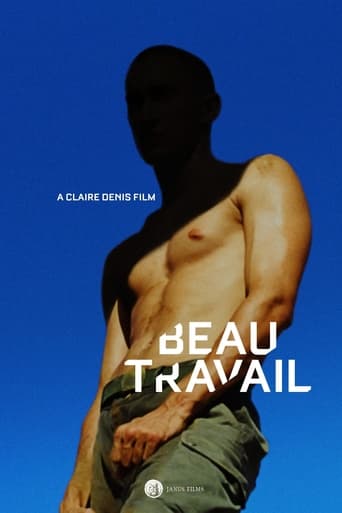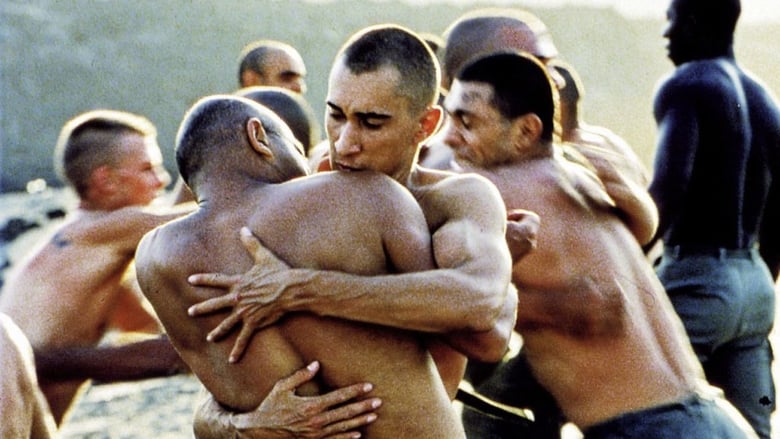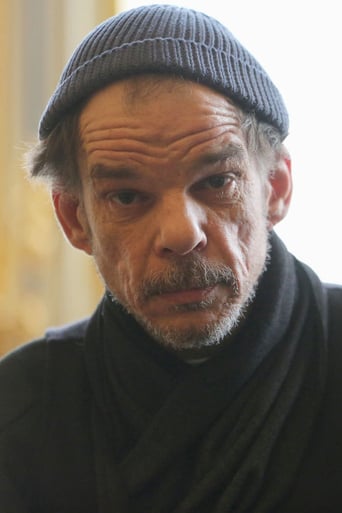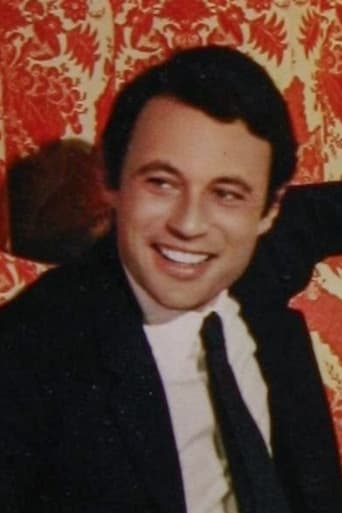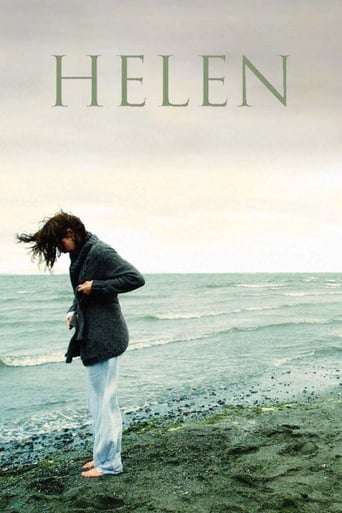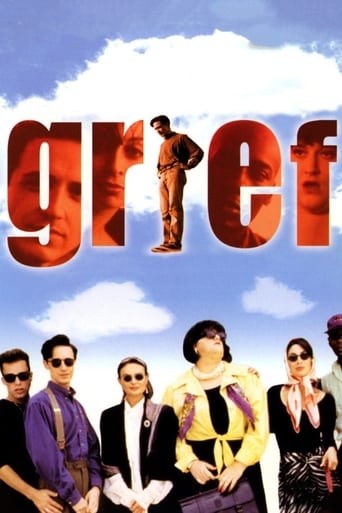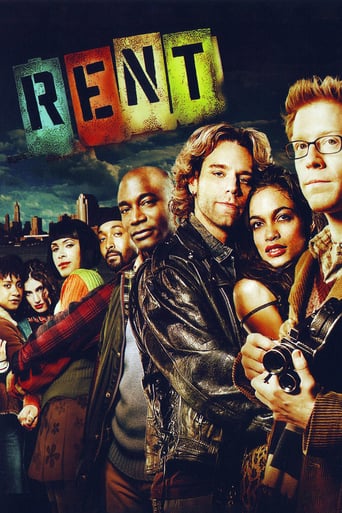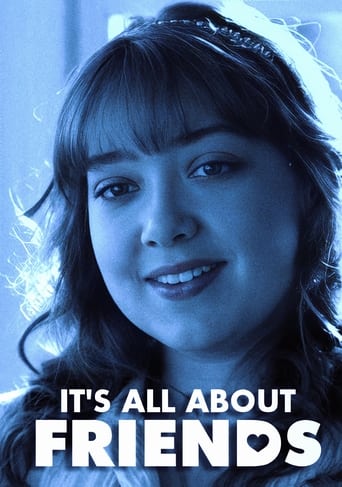Beau Travail (2002)
Foreign Legion officer Galoup recalls his once glorious life, training troops in the Gulf of Djibouti. His existence there was happy, strict and regimented, until the arrival of a promising young recruit, Sentain, plants the seeds of jealousy in Galoup's mind.
Watch Trailer
Cast


Similar titles
Reviews
Very disappointing...
This is a coming of age storyline that you've seen in one form or another for decades. It takes a truly unique voice to make yet another one worth watching.
Very good movie overall, highly recommended. Most of the negative reviews don't have any merit and are all pollitically based. Give this movie a chance at least, and it might give you a different perspective.
Watching it is like watching the spectacle of a class clown at their best: you laugh at their jokes, instigate their defiance, and "ooooh" when they get in trouble.
"Gold in the mountain, and gold in the glen, and greed in the heart, heaven having no part, and unsatisfied men." - Melville Claire Denis directs "Beau Travail". The film's loosely based on several Herman Melville poems ("The Night March" and "Gold in the Mountain"), as well as Melville's "Billy Budd", a maritime tale which questioned man's thoughtless submission to various forms of authority (military, media, biblical, political etc). Denis' film swaps the novella's maritime setting for the sandy deserts of Djibouti, a country in Eastern Africa. Her protagonists are soldiers in the French Foreign Legion. They're stationed in Djibouti to do the neo-Imperialist biddings of France and (unofficially) the US, who to this day maintain violent, dictatorial puppet regimes in the country. The site of the only "official" US military bases on the African continent, the country is also used as a staging ground in an overall strategy to dominate the Horn of Africa, the Gulf of Aden and the Arabian Peninsula. From Djibouti, various plots were, and continue to be, mounted to destabilise Ethiopia and Somalia."Different viewpoints count," Sergeant Galoup (Denis Lavant) narrates at the start of the film. He's speaking in hindsight. The film then jumps from Galoup's apartment in France to the deserts of Djibouti, several months prior. Here Galoup feuds with Gilles, a fellow soldier whose physical beauty, social standing and strength inexplicably make him jealous. Later Galoup orders Gilles to trek across the African desert without water and with a tampered compass. The man almost dies, leading to Galup's swift court-martial. Significantly, Gilles is rescued by a group of Djiboutis. Other scenes focus on the persecution of black officers within the Foreign Legion. The film ends with close-ups of Galoup's veins, quietly pumping blood, before a beautiful sequence in which he dances to Corona's "The Rhythm of the Night". More than Melville, key influences on the picture are Jean-Luc Godard's "Le Petit Soldat" and Resnais' "Muriel". Both dealt with the Algerian war, a then-taboo subject which led to both films being attacked and banned. Denis' film maintains the structure and voice-over narration of Godard's film, linkages which are made explicit by the military superior in her film being named after the hero of Godard's. They're also played by the same actor (Michel Subor). Interestingly, the voice over narration in both films are designed to echo each other. "I have a lot of time ahead of me," the narrators of Denis' film begins, precisely the line which ends Godard's picture. The message is clear. History rolls on, and France's imperialist doings didn't end with Algeria. Denis spent much of her childhood in Djibouti. She wrote "Beau Travail's" script herself and teamed up with female cinematographer Agnes Godard for the shoot. The duo create a film which plays like a series of dreams within dreams, mirages within mirages, memory fragments constantly dancing and fusing and fluttering off into the wind. The film unfolds like dance, ethereal, hazy and liquid. Most of its running time consists of shots of soldiers training, working, exercising and waiting. These sequences are simultaneously banal and highly choreographed, the men's bodies bending to some unspoken dance routine. Throughout the film Denis captures the dangers of machismo, male egos and a kind of simmering hunger for violence. But her imagery is both homo-erotic and neutering; these warriors are feminized, painted as infants, small boys, sensitive, confused, pitifully childish and overly emotional. Denis softens everything, turns masculinity into something weak and soft and round, which indeed was always the unspoken core of even "traditional masculinity". Still, these soldiers are dangerous. And they are dangerous precisely because of their weaknesses. Most of the film functions as a dreamy allegory for the white man's desire to violently assert himself over the Other, be they African or fellowman; to deny the Other's culture, voice, customs, practises or right-of-governance. Galoup in particular is obsessed with control, organisation and the meticulous. Some have said the film is about Galoup's "homosexuality", but this misses the point. Whilst all sexuality is on some level violent, the film itself is almost completely asexual. The soldiers have been conditioned to repress love, not sex, and it is this conditioning which flies in the face of the men's homo-social love, which in turn results in violent blow-back. The film's title means "beautiful work", referring ironically to the Empire's work in Africa, and of course its long-standing rationalisations for bloodshed. The film's title is also a command, a call to do "good work" rather than the devil's deeds. Much of the film is sprinkled with shots of African women, who exist outside the soldiers' story. Like a Greek chorus, they're positioned to both witnesses white cruelty, silently judging from afar, and to mock the petty men skirmishing below them. The gyrations of these African women to pop songs is later mirrored to Galoup's own dance sequence (no rehearsals, shot in one take), in which his ego softens, he symbolically turns his back to a reflection of himself and he finally cuts loose. This is the only moment in the film in which Galoup shifts from a watcher and subject - and by extension a master - to an object. He relinquishes control and allows us to possess a piece of him. Denis' work frequently deals with the Empire's relationship with Africa ("White Material", "No Fear, No Die", "Chocolat", "35 Shots of Rum" etc). Of these, "Beau Travail" is perhaps her most unconventional film. See too "35 Shots of Rum", arguably a better film, which uses Jean Renoir as a springboard as Denis uses Godard here. 8.5/10 – Worth two viewings.
It was the quotation from Benjamin Britten's Opera, "Billy Budd," that alerted me that Clair Dennis, must know a little bit about Opera.Billy Budd has a parallel story in which a handsome young sailor becomes the object of repressed homosexual rage by a character named Claggart. Billy has a severe stutter and has difficulty expressing himself, so when he is accused by Claggart of fomenting mutiny in frustration he strikes his accuser, a capital offence in the Queen's Navy.One of the characteristics of French Opera is the usual inclusion of ballet either as a scene or integrated into various parts of the opera. Think of the many dance scenes in Bizet's "Carmen," or the Bacchanale in Saint-Saëns "Samson et Dalila." Beau Travail uses the wonderful drill and exercise scenes as dance interludes, and of course there is Galoup's spectacular dance at the end of the film. A minor connection to Opera is that as an art form Opera excels at portraying the landscape inside the head of a character. As well Operas tend more often to be about "landscape" in a broad sense than they are about "narrative." This to some extent explains what some people may find static in this film. The Film is about the landscape of Algeria, the landscape of being a Legionaire, and the twisted landscape of Galoup's head,.
I was very happy with this movie. The languid pace of the editing serves the remembrances of a jealous and obsessive commanding officer, as he recounts his dealings with a young legionnaire. Claire Denis skillfully allows static shots to evolve into moving shots and still figures to resemble the dynamism of Grecian statues. Many times, while watching the legionnaires perform their arduous training drills, I was reminded of classical statues. I also noticed how there was a vague homo-erotic underpinning to the legionnaire lifestyle, never outwardly expressed. Galoup, the officer who remembers the story for the viewer, only has access to certain aspects of the events portrayed. This leaves the viewer to do much of the work in figuring out what has happened. In the end, the narrative splits and we have a vision of Sentain, the young legionnaire, suffering in exile. I found this split necessary and welcome though, as it perhaps constitutes a dream or fantasy being experienced by Galoup. Galoup's obsession with Sentain allows him to construct his own version of what happens to the younger man when he left the legion. I was also sometimes reminded of '300', though only inasmuch as they are both movies that show a certain respect and love for the male form. However, in '300' the male form becomes a device of basic warfare or basic sexual desire. In 'Beau Travail,' the male form is much more utilitarian, perhaps even universal. Effort went in to showing the monotony and conformity of the chores and drills; the things that cause all of the men to look, act and think the same, and the overall effect that militarization might have on the psyche of the individual. I highly recommend this movie to anyone who hasn't seen it.
Claire Denis' loose adaptation of Herman Melville's "Billy Budd", changes the story from taking place on the ocean to the African country of Djibouti, an impoverished nation with an outpost for training of the French Foreign Legion. Ms. Denis, who spent part of her life in Africa, sees the similarities of both stories and together with her co-writer Jean-Pol Fargeau, set to show us how the Melville novel impressed her.The group of legionnaires, we meet, are seen in different stages of their training. The men, who come from different walks of life, and countries, have nothing to do. The only entertainment for them is dancing with the local women in bars. Galoup, the second in command, of this outpost, is the narrator of the story. We realize he is telling the story from a civilian point of view since he is no longer a legionnaire.The man in charge, Galoup, is a strange person. He starts noticing how one of his men, the mysterious Sentain, does everything he is assigned to do, and more. When a helicopter crashes and Sentain risks his life in order to save a pilot, the troop commander, Bruno Forrester, suddenly sees in Sentain an courageous man. Forrester also observes how Galoup reacts to Sentain's sudden recognition. It's the commander who tells Galoup that backstabbing doesn't fit in the Foreign Legion, but it's already too late. Galoup, who is consumed in his dislike for Sentain, takes his subordinate into the desert as a punishment, which unknown to him will backfire on him.Claire Denis has amassed an interesting cast to give life to her vision. Agnes Godard, the cinematographer has shot the film showing us great vistas of Djibouti and the Golf of Aden. The film has the feeling of a ballet as one watches the men's shadows on the ground as they meditate after a grueling training session. Even though there is no clear indication Galoup is gay, but the way he watches Sentain leaves the viewer to think otherwise. The way Galoup touches Forrestier's bracelet is another indication of what is really troubling Galoup, in spite of the fact he is seeing one of the local women.Denis Lavant, an intense actor, plays Galoup with such control, yet it's clear to see what's eating him. Gregoire Colin, another actor with a great range, hardly utters a word throughout the film, yet, he comes across loud and clear in knowing what his superior is doing to him and being a better man for taking the abuse. Michel Subor is the troop's commander, a man into himself, but wise enough to detect all what's happening to the young people under his command.Clair Denis created an exquisite work of art. Ms Denis is a director that always delivers. The film solidifies her as one of the best women making movies in France, and all over the world, for that matter.

